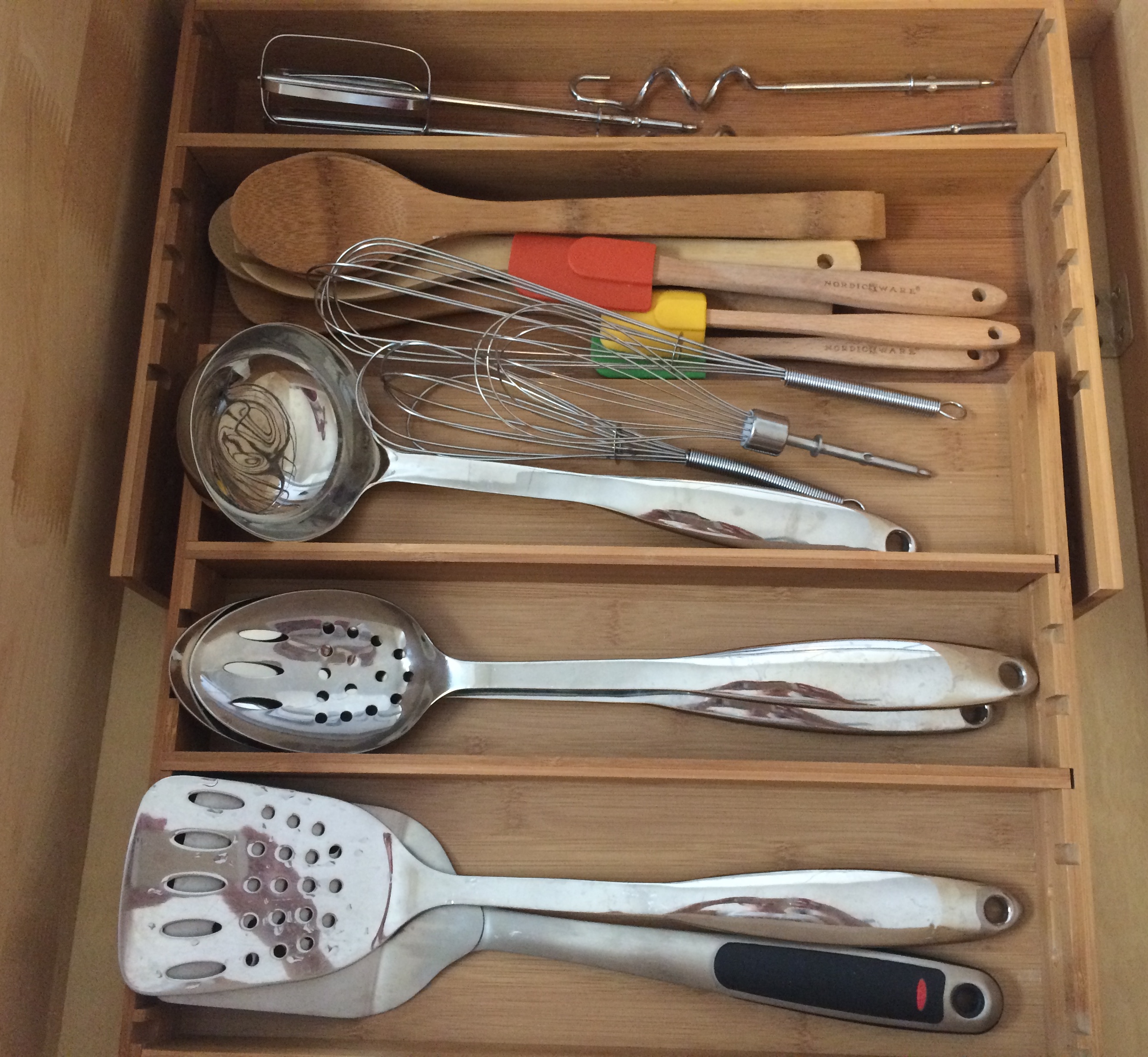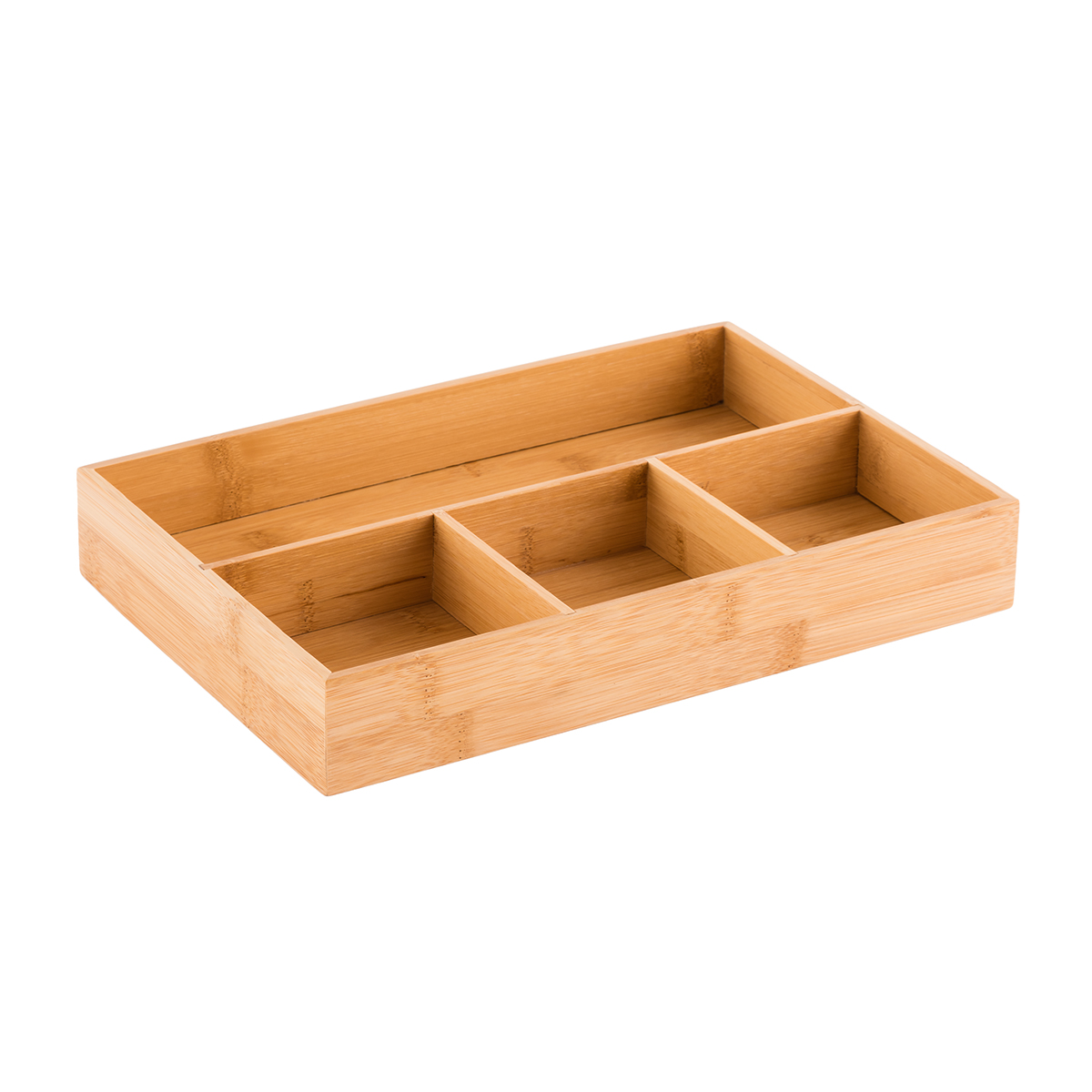During my recent move, I donated a large box of kitchen goods—2 turners, 5 wooden spoons, 2 spatulas, a set of mixing bowls, wine glasses, etc.—and kept only 2-3 of everything else, not including dishes, glassware, and cutlery (of which I try not to own more than 8). You might think it sounds crazy so few kitchen utensils: what if you’re simultaneously cooking multiple dishes, and you need more than two turners? Or if your spoons are dirty? Or if you… just need more than two?
I know what you’re probably wondering: does she even cook? Yes, I cook. I make home made meals every night and bag lunch every day. I don’t purchase coffee (I make my own in the morning). Not only do I use every single item in my kitchen, but also I make sure to clean and put away each item when I’m finished. No, I don’t have children, and yes, I’m sure it will be more difficult when I do; but if you don’t make a habit of immediately cleaning and putting away items, and you don’t make a habit of designating organized spaces for your items, then it doesn’t matter if you have five children, one child, a spouse, or you’re single and live alone–it won’t get done unless you do it. Similarly, it will get done if you do it. One of my mottos is “Just do it” (or is that Nike’s?). Another motto is “Whatever you have to eat, save for tomorrow; whatever you have to do tomorrow, do today.” Yes, I am totally in War mentality (I’m a slight perfectionist).
1) Pare Down
The first step to organizing your kitchen is to get rid of (sell, donate) multiples. During my recent move, I donated every plastic turner, spatula, spoon, and bowl to my younger sister. That was the easiest way to pare down.
2) Organized Storage
The best storage and organization product I’ve found to organize my utensils is this bamboo drawer organizer tray from The Container Store. Made from bamboo, an economical and environmentally friendly resource. You can pull it apart and voilà—it turns into two organization trays! If I can’t fit all my utensils in these drawers, then they go bye-bye!
I’ve already entertained many groups of people, serving dinner to at least eight. Having fewer things hasn’t turned out to be a problem, and I don’t anticipate it will become one.
Organization, minimalism, and frugality intertwine to contribute to a joyful, meaningful life. When you adopt the philosophy of minimalism, in at least some parts of your life, it’s easier to remain organized. Having fewer things means having less to organize. Knowing what you own and having it available to use at any given moment allows you to save money. When you know what you have and it’s accessible, you’ll be less inclined to spend money on more things, which only adds to your clutter.
3) Purchase Quality Items (No Plastic)
Owning fewer items also allows you to own quality items. I try not to own plastic, and use only ceramic, wood, and glass cook/bake/dish/glassware.
My friends with children remind me that once I have energetic, clumsy kids, I’ll want to purchase plastic plates and glasses. I don’t have children yet, but I still plan to keep my stuff at a minimum, and use only quality items, refraining from plastic.
In fact, the Montessori education philosophy insists on using “real” dishware (rather than plastic) for children because allowing children to use glass and ceramic shows the child we trust and respect them while also allowing them to develop the skills to care for such items. If a child drops a plastic plate a thousand times, they’ll never understand the consequences of dropping a ceramic plate, thus never really developing care, respect, and gentleness for items. When we don’t respect things, and see them as disposable, it leads to us—well—disposing of them and purchasing more and more things. I don’t need to tell you what happens next, do I? We accumulate more things, ruin them, go buy more things, lose them, and soon our house is cluttered, we’ve wasted so much money, and we’re inexplicably (psst: it’s the things!) stressed and overwhelmed.
4) Maintain This System
Rather than hoarding low quality items, losing them, ruining them, and spending money buy more to just repeat the cycle, I believe the best thing to do is to buy few quality items, meticulously care for them, and use them for as long as possible without purchasing new items.
Maybe if we all did this, the world would be a slightly better place. Sure, huge corporations would make less money, but we’d all end up a lot richer in many different ways.
Liked this post? Subscribe to Meaningfully Organized to receive new posts via email.







